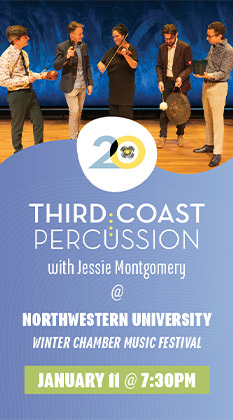Eclecticism and intimacy still stalwarts of the Chicago Ensemble experience
Long before chamber music became the domain of professionals, making music was something that family and friends used to do together to entertain themselves.
That same domestic spirit still permeates performances of the Chicago Ensemble, now in its 33rd season, which seeks to involve audiences with the music-making in a direct and intimate way.
Sunday afternoon’s Hyde Park soirée at the University of Chicago’s International House was a perfect case in point: concertgoers were treated to a well-stocked wine-and-cheese buffet throughout the concert, which could be taken to tables — complete with tablecloths and lit candles — across the room. This not only allowed for physical as well as esthetic sustenance, but allowed for folks to mull over what they were hearing with their fellow listeners in between individual pieces.
Helping that informal and familial spirit was Chicago Ensemble founder and pianist Gerald Rizzer acting as friendly host, greeting guests and supplying informal verbal notes on the pieces as the afternoon went along.
And what a remarkably diverse program it was: everything from Bach to Berg was presented across an eclectic concert called “Voice, Winds and Piano.”
“Voice” in this case meant both soprano Michelle Areyzaga and mezzo-soprano Stacy Eckert, who would sing one selection each and then combine for a duet, as was the case with three arias from Bach cantatas that opened the program.
Areyzaga’s upbeat and sterling soprano in Was Gott tut, das ist wohlgaten from BWV 100 set up a delightfully florid flute obligato supplied by Susan Levitin, the first of the “winds.” The mood changed drastically for the somber Betörte Welt from BWV 94 rendered slowly, woefully and with rich, dark and over-vibratoed tones by Eckert with Levitan’s flute reciprocating. Wir eilen mit schwachen, doch emsigen Schritten from BWV 78 formed a finale of sorts to the set with both Areyzaga and Eckert offering a prayer of thanksgiving in a vibrant duet where voices blended adroitly.
Clarinetist Elizandro Garcia-Montoya provided virtuoso accompaniment to Eckert’s rendition of Sesto’s aria Parto! Ma tub en mio from Mozart’s penultimate opera, La Clemenza di Tito. The tempo was slow, even when the piece took off, yet Eckert’s climactic runs remained indistinct nonetheless.
Eckert seemed more in her element with 20th-century Hungarian composer Mátyás Seiber’s Drei Morgenstern Lieder, where she tossed off the nonsense-syllable delights of German satirist and poet Christian Morgenstern with ease, style and a variety of vocal nuance that were perfectly complemented by Garcia-Montoya’s steady and often whimsical clarinet accompaniment.
Wonderful, too, was Eckert’s rendition of an early Aaron Copland song, a 1923 setting of Elizabethan poet Richard Barnefield’s As It Fell Upon a Day which places the mezzo-soprano as the modal obligato for accompanying — and often distinctively contrasting — clarinet and flute lines.
Areyzaga’s shining moment came with Schubert’s Der Hirt auf dem Felsen (D. 965), which had her poignantly setting up a call and response antiphon with Garcia-Montoya’s clarinet mournfully echoing her melancholy.
Levitin and Garcia-Montoya were each given their moments to shine as well: Levitin in Albert Roussel’s 1924 neo-Impressionistic Joueurs de flûte, Op. 27, which allowed her to take on the aural personalities of four flute-inspired characters from various world mythologies, and Garcia-Montoya in Alban Berg’s pre-serial Four Pieces for Clarinet and Piano, Op. 5, which both he and Rizzer played with eloquence as the neo-Romantic classic that it is.
In addition to a series of delightful Mendelssohn song duets that Areyzaga and Eckert collaborated upon, the pair also alternately teamed up for a series of Sephardic Jewish songs as a grand finale that also gave accompanying prominence to Levitan, Garcia-Montoya and Rizzer as well.
Posted in Performances


